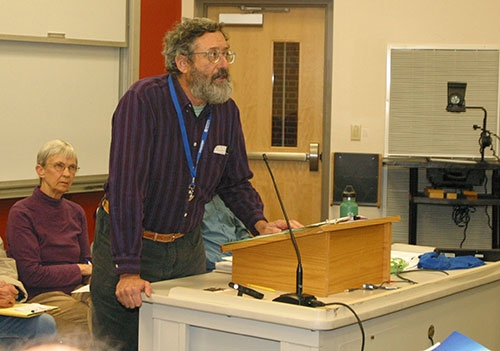You are here
Home ›We the People: Cienfuegos discusses Community Rights Movement during presentations in Waukon and Decorah

Paul Cienfuegos of Portland, OR addressed crowds in both Waukon and Decorah this past week in regard to the Community Rights Movement, an effort for residents to gain more local control in regard to corporate activity. Photo by Lissa Blake.
by Lissa Blake
If current legislation will not protect the people, then people have the right to create new law.
Paul Cienfuegos of Portland, OR recently visited Waukon and Decorah to talk with locals about the Community Rights Movement. Cienfuegos has 40 years of experience in social justice. He is the founder of Democracy Unlimited of Humboldt County in California and has held dozens of “First Steps in Dismantling Corporate Rule” workshops across the country. In September 2013, he helped launch the Oregon Community Rights Network (OR-CRN), the seventh state CRN to be launched so far in the United States.
Approximately 15 people attended a community rights meeting at Fiesta Vallarta in Waukon Tuesday, March 7. Cienfuegos also participated in a panel discussion at Luther College in Decorah Sunday afternoon, March 12.
According to Cienfuegos, passing a community rights ordinance helps communities accomplish a number of things:
• It bans a certain kind of corporate activity which the state considers legal and normal, which the local community is opposed to, such as frac sand mining, big box stores, water withdrawal, sewage dumping, confined animal feeding operations, (CAFOs) and more.
• It strips corporations of being able to exercise their so-called "constitutional rights".
• It enshrines the rights of a local community to govern itself and protect its health and welfare free of interference from the state.
ABOUT THE MOVEMENT
Since 1999, the Community Rights movement has been spreading across the United States. Approximately 200 communities in eight different states have passed new laws to protect themselves from legally permitted activities where they live.
“These laws are a direct challenge to a variety of structure of law that have made it literally illegal for local communities to protect their own health and welfare,” said Cienfuegos.
CIVIL DISOBEDIENCE
Cienfuegos said while instituting a local ordinance is an act of civil disobedience, of the 200 communities across the country that have passed a community rights ordinance, only five percent have been sued. “It is a political and legal strategy that is incredibly successful,” he said.
Cienfuegos said although he gives dozens of workshops a year, he finds that most of the people who are willing to go forward with pursuing a Community Rights (CR) ordinance live in conservative, rural communities.
“The right tends to think this is a big government problem. The left tends to think giant corporations have taken over the government, and that is the problem. The left understands that big government is serving the corporations. We already have common ground if we can just use the same language,” he said.
CELDF
Over the years, Cienfuegos has worked closely with the Community Environmental Legal Defense Fund (CELDF). A statement written by CELDF about community rights contends, “The right of local, community self-government is a fundamental, individual political right - exercised collectively - of people to govern the local communities in which they reside.
“The right includes three component rights - first, the right to a system of government within the local community that is controlled by a majority of citizens; second, the right to a system of government within the local community that secures and protects the civil and political rights of every person in the community; and third, the right to alter or abolish the system of local government if it infringes those component rights.”
MOVING FORWARD
Cienfuegos encourages every community that is concerned about the power of corporations to continue having conversations on the topic. “We are not merely consumers and workers. We are ‘We the People.’ We are the sovereign people. We are guardians of life for present and future generations,” he said, adding that corporations are not good corporate “citizens.”
“We must again define how they are allowed to operate, as we once did for a century after the American Revolution, in order to protect the health and welfare of our communities and of nature,” he writes.
For more information about the community rights movement, visit PaulCienfuegos.com and CELDF.org.

